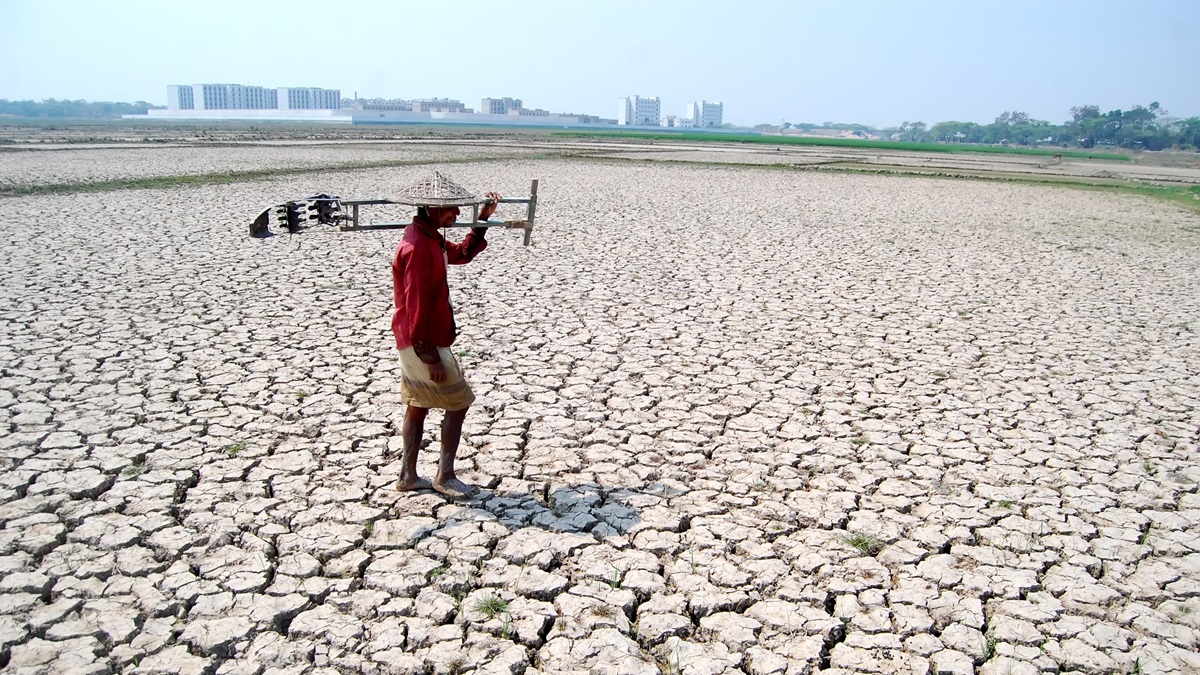Eight years after the Paris Agreement, finance for fossil fuels continues unabated at trillions of dollars annually.

© Shutterstock/HM Shahidul Islam | A farmer in Sylhet, Bangladesh during a drought.
Estimated funding needed for climate action and UN Sustainable Development Goals is merely 1% of global financial assets.
Fossil fuel financing still exceeds $1 trillion annually eight years after the Paris Agreement.
Public and development banks crucial for aligning finance with climate and development goals need increased lending capacities and policy space.
An estimated $4 trillion needs to be mobilized each year to fight climate change and achieve the Sustainable Development Goals (SDGs) UNCTAD’s latest Trade and Development Report says.
This amounts to the GDP of Germany in 2022 and can only be accomplished through a major shift in global financial flows, entailing the reallocation of trillions of dollars currently funding – directly and indirectly – economic activities that undermine these goals.
The estimated financing needs represent just 1% of total global financial assets, currently valued at more than $470 trillion. “But it’s not easy to shift resources away from long-standing and often profitable activities,” says Anastasia Nesvetailova, head of UNCTAD’s macroeconomic and development policies branch.
“It’s always challenging to guide resources towards new or less certain investments for sustainable development,” she adds.
The report highlights that, for example, eight years after the Paris Agreement, finance for fossil fuels continues unabated at more than $1 trillion annually to companies supporting new development projects.
“This reinforces long-standing climate and finance inequalities,” Ms. Nesvetailova warns. “Finance for fossil fuels comes largely from the richest parts of the world, but it is the poorest who suffer most from the impacts of climate change. They also get the least benefits from fossil fuel energy.”
‘Sticky’ fossil fuel subsidies hit record levels
Exacerbating matters are “sticky” subsidies for fossil fuel production and consumption, which reached a record $1.3 trillion in 2022. Production subsidies alone accounted for $51 billion.
“Phasing these out would help both the climate challenge and free up scarce public resources for governments to put to other uses, including renewable energy and just climate transition,” says UNCTAD economist Diana Barrowclough.
But the report stresses the difficulty of changing the status quo, especially when there are millions of people whose livelihoods depend on fossil fuels for energy and entire systems of production and consumption.
Also, banks, insurance companies and pension funds are heavily exposed to the sector. In some cases, an abrupt change could send severe financial shocks throughout the economy.
“Most importantly,” Ms. Barrowclough says, “many countries still lack basic energy supplies and have yet to diversify their economies and develop.”
‘Turn down the taps’ without cutting off developing countries
The report emphasizes that the process of “turning down the taps” must be sensitive to the differing needs of developing countries and poor communities to ensure the transition is sustainable and just.
"The process and speed of scaling down fossil fuel finance will likely differ from one country to another,” Ms. Barrowclough says. “And it must be complemented by a scaling up of investment in alternative activities that provide income-generating jobs and support a developmental path for the future.”
The report’s findings were reinforced by the landmark decision at the COP28 climate summit to phase out fossil fuel subsidies that don’t address energy poverty and to transition away from fossil fuels in energy systems in a just, orderly and equitable manner.
Key role for public and development banks
Public and development banks “are the most significant source of capital for the long-term and concessional terms needed,” Ms. Nesvetailova says. “They are also the traditional source of the catalytic push that can spark economic transformation.”
Yet the $230 billion lent by the main multilateral development banks in 2020 is just a fraction of the $4 trillion needed. The report echoes the call by UN Secretary-General António Guterres to sharply scale up their lending capacities and to increase their policy space.
Finally, these various efforts will work best when supported by a broader and more active role for central banks. As the apex of the financial system, central banks can align their activities with climate and development goals as they set the rules and regulations for the entire financial system.
No shortage of resources
UNCTAD identifies reforms that can help, including moving away from the belief that central bank operations can be “market neutral”, requiring full climate disclosure for financial institutions and using variable interest rates and reserve requirements for loans compatible with long-term fossil fuel and developmental policy goals.
"The world has enough money to fight climate change and support development. It's just not channeled in the right direction,” Ms. Nesvetailova says. “It's more a question of political and social will than of finance.”



